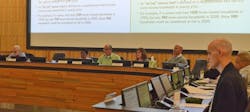MTC Recruits for New Policy Advisory Council Term
The Metropolitan Transportation Commission has announced it is recruiting Bay Area residents for its 27-member Policy Advisory Council. The Policy Advisory Council is a citizen advisory committee created by the Commission to advise MTC on a range of topics including regional planning, housing, land use, greenhouse gas reduction, public transit improvements, and new revenues for transportation in the Bay Area. Advisors will jump into the thicket of transportation, learn about the complexities of funding, and help analyze the connections between transportation, land use, air quality and climate change.
Applications for the Policy Advisory Council will be accepted through Monday, June 12, 2017. Applicants must be willing to serve a four-year term currently scheduled to begin in September 2017 and to end in July 2021. Committee meetings are held on the second Wednesday of the month in the afternoon at MTC’s offices in San Francisco. Members receive a small stipend and travel reimbursement for attendance at each meeting. Membership of the Policy Advisory Council is structured around interests related to the economy, the environment and social equity.
Nine economy and environment representatives will be appointed to at-large seats. Appointment recommendations are made by Chair Mackenzie and Commission Vice Chair and Alameda County Supervisor Scott Haggerty. The make-up of these nine representatives must be as follows:
- Four of the nine members represent economic interests, and four bring an environmental perspective; the ninth member may be selected from either category.
- In addition, five of the nine must be from each of the five most populous Bay Area counties – Alameda, Contra Costa, San Francisco, San Mateo and Santa Clara.
Eighteen equity representatives will be appointed, and are recommended by Commissioners in each county. These 18 representatives will include:
- Nine members (one from each county) representing communities of color and issues affecting low-income residents or environmental justice.
- Nine members (one from each county) representing issues related to transportation for seniors and persons with disabilities.
Individuals representing economic, environmental or equity interests should have either a work, academic or extensive volunteer background in the subject, or have life experiences that have made them extremely familiar with these issues.
